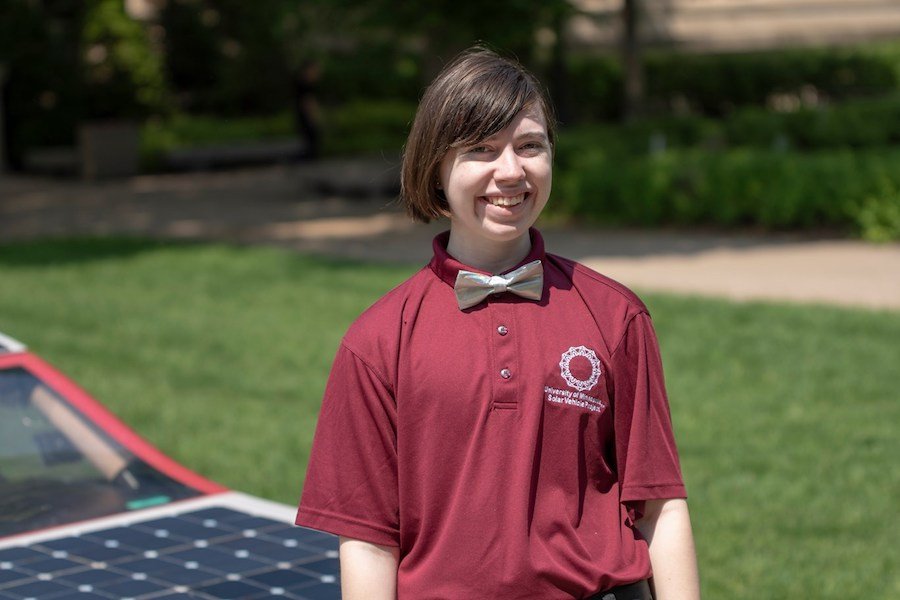For CSE student, climate change solutions are bigger than electric cars

Electrical engineering senior wins award for essay on racism and sustainability
August 3, 2021
When Amethyst O’Connell started their academic career, they wanted to be a documentary filmmaker (O’Connell’s pronouns are they/them). O’Connell aspired to highlight and educate the public on the big, important issues of our world.
“But then I thought, why should I waste all this time showcasing the problems of the world when I can actually try and tackle them?” O’Connell said.
So, they changed course. After graduating from Saint Paul College, a community and technical college, O’Connell transferred to the University of Minnesota to major in electrical engineering.
Now a senior in the College of Science and Engineering, O’Connell—who minors in sustainability studies—participates in the Solar Vehicle Project student group and is planning a career that includes solving the climate crisis.
As for showcasing this problem—O’Connell has done a bit of that already.
O’Connell recently won third place in the 2021 Midwest Climate Summit’s Climate Stories Contest for an academic paper titled, “The Future of Sustainable Transportation and the White Supremacist Trappings of the Environmental Movement.” The paper explores how racism has influenced the modern transportation system, and how that system contributes to global warming. O’Connell’s possible solutions address white privilege by improving access to and diversifying the pool of people designing these systems.
Highway to climate change
O’Connell’s interest in equity and inclusion grew while studying at St Paul College, where people of color make up 65 percent of the student body.
“I was one of very few white people,” O’Connell said.
“It was an interesting experience going there, actually having to confront race and what it means to be white.”
Both that experience and a longtime interest in sustainability drove O’Connell to explore this idea of institutional racism’s influence on climate change. O’Connell’s entry to the Climate Stories Contest doubled as a capstone project for SUST 3003, a key course in the University’s sustainability studies minor.
In the essay, O’Connell states that while electric cars and solar vehicles are a great sustainable solution on paper, the technology is part of a transportation infrastructure built to prioritize the needs of white people over people of color. Plus, there are many intersectional layers at play, such as socioeconomic and class issues.
“Like our highway system, for example,” O’Connell explained. “It’s very efficient for a typical white person who lives in Roseville or Edina. If you work in downtown Minneapolis, you get in your car and drive to Minneapolis, park, get to your job, and then go back home. But for some of my classmates of color, they don't necessarily have the same car access that white people do, and even if they do have the same car access, they're not starting from the same spot of easy highway access in the suburbs.”
O’Connell argues that the current transportation system not only negatively impacts people of color with hour-long bus rides and longer commutes, but it also results in higher carbon emissions.
“My research demonstrates that this transit infrastructure is designed to work for only one group of people, and when you do that, it's pretty obviously carbon inefficient,” O’Connell said.
“You can't fight physics with climate change. If you have a massive structural inefficiency, you're going to pay for that inefficiency in energy.”
Sustainable—and equitable—solutions
So, what is the solution? According to O’Connell, it’s tricky.
“We need a transportation system that works for us all,” O’Connell said.
“And I shouldn’t be the one saying what that looks like. Diversity of ideas and lived experience is needed moving forward to find a solution.”
A good start, as O’Connell notes in the essay, is getting more people of color involved in engineering. The idea is that if there’s a larger diversity of people designing the systems that take us from one place to another, then the solutions themselves will be more equitable.
Recruiting a more diverse group of students, faculty, and staff is an ongoing goal of CSE’s Diversity & Inclusivity (D&I) Alliance, a grassroots effort formed in 2019. The alliance brings CSE students, faculty, postdoctoral researchers, staff, and alumni together to identify issues surrounding diversity, equity, and inclusion and implement practices to improve the college’s climate.
“One optimistic thing is that since George Floyd's passing, I feel like the University of Minnesota is actually confronting some of its internal biases a little more than before,” O’Connell said. “I’m happy to see the work that is being done, and I’m glad that there's time being devoted to that. I hope that the University diverts more time and resources into that.”
Read O’Connell’s winning Climate Stories Contest submission.
Story by Olivia Hultgren
If you’d like to support students in the University of Minnesota College of Science and Engineering, visit our CSE Giving website.
